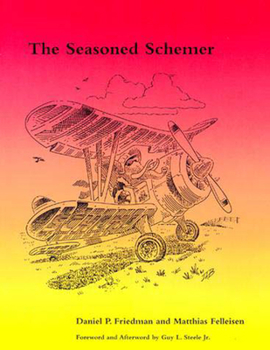The Seasoned Schemer
(Book #3 in the The Little Schemer Series)
The notion that thinking about computing is one of the most exciting things the human mind can do sets both The Little Schemer (formerly known as The Little LISPer) and its new companion volume, The Seasoned Schemer, apart from other books on LISP. The authors' enthusiasm for their subject is compelling as they present abstract concepts in a humorous and easy-to-grasp fashion. Together, these books will open new doors of thought to anyone who wants to find out what computing is really about. The Little Schemer introduces computing as an extension of arithmetic and algebra; things that everyone studies in grade school and high school. It introduces programs as recursive functions and briefly discusses the limits of what computers can do. The authors use the programming language Scheme, and interesting foods to illustrate these abstract ideas. The Seasoned Schemer informs the reader about additional dimensions of computing: functions as values, change of state, and exceptional cases. The Little LISPer has been a popular introduction to LISP for many years. It had appeared in French and Japanese. The Little Schemer and The Seasoned Schemer are worthy successors and will prove equally popular as textbooks for Scheme courses as well as companion texts for any complete introductory course in Computer Science.
Format:Paperback
Language:English
ISBN:026256100X
ISBN13:9780262561006
Release Date:December 1995
Publisher:MIT Press
Length:224 Pages
Weight:0.85 lbs.
Dimensions:0.4" x 6.9" x 9.0"
Age Range:18 years and up
Grade Range:Postsecondary and higher
Customer Reviews
2 ratings
introduces the rest of scheme (almost)
Published by Thriftbooks.com User , 18 years ago
The Seasoned Schemer continues where the Little Schemer left off introducing local variables via let and it's variations including letrec. Set!, the syntax for changing a variables value is introduced. Continuations, as used for escaping from an computation and for going back to previous position in code are also introduced. There are less references to the accomplishments of famous computer scientists in this book than in the Little Schemer which I found to be disappointing. However, I greatly enjoyed this book and would recommend it to anyone wanting to increase their understanding of the Scheme programming language. Although scheme's vector data type is not introduced, I think you will have enough of an understanding of Scheme after reading this book to make substantial programs.
Excellent book on thinking recursively
Published by Thriftbooks.com User , 24 years ago
This book is the second half of "The Little Schemer". It expects you to have mastered the previous volume, so it starts fast and picks up speed from there.It covers a lot of ground in a slim volume (just as in "The Little Schemer"). This book introduces the concepts of closures and call-with-current-continuation (among other things).As with "The Little Schemer", this book's strength is in its socratic instruction method. Lessons are written and illustrated as conversations between the reader and the instructor (in question/answer format). While this sounds strange, it is actually surprisingly effective as a means of learning the material. It might seem somewhat like rote instruction, but it can often frame foreign concepts in a rememberable fashion.Neither of these books require much in the way of background or familiarity with the material. They were created as a means of teaching non-programmers to program in Scheme. However, I think they hold value for trained programmers as well.







